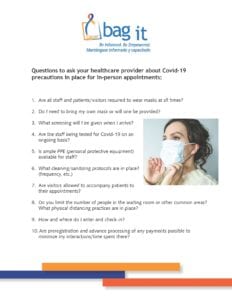
by Bag It Team | Aug 18, 2020 | Educational Articles
 Let’s say the unthinkable happens.
Let’s say the unthinkable happens.
You suddenly become hospitalized due to Covid-19 and are unable to communicate, make decisions for yourself or have a loved one by your side.
Preparation of your advance directives for health care is the best way to give voice to your wishes and what matters most to you. A healthcare power of attorney informs your doctors about your preferences for medical care and could give helpful insights to those you select to speak on your behalf. It’s impossible to account for all the possible scenarios and every potential long-term impact on your health from Covid-19. But even expressing what makes life worth living for you or the quality of life you don’t want to suffer later can guide the decisions made about treatments to provide and when.
If you’ve already put the appropriate documents in place and shared them with the right people, good job – but keep reading if you did that pre-Covid! Now is a good time to pull them out and reread them to make sure you are comfortable with your instructions in light of the pandemic. Do they reflect your treatment preferences no matter the reason for your condition or critical illness, or do you have definite ideas about treatments you do and do not want in the case of Covid? Are any changes needed to the named agents appointed to act on your behalf? Do you need to add back-up trusted agents in the event your appointed spouse/partner or other household members also fall ill?
Whether you need to complete these documents for the first time or an update is due, make this a priority today! Below is more information about where to find resources for your state as well as tools and resources to complete the process.
The Conversation Project
Downloadable life care planning packet for Arizona
Downloadable life care planning packet for Arizona: (Spanish)
AZ End of Life Partnership
Downloadable advance directives for 50 states:
aarp.org/caregiving/financial-legal/free-printable-advance-directives
Caring Info
POLST (portable medical order for emergency medical care)
Once the paperwork is in order, provide copies to the involved people in your life and also have a frank conversation with them about what’s important to you. While it may not be easy to talk about it, having the documents ready and sharing your personal values with them means everyone will feel more prepared and brings a bit of control and peace of mind – just in case the unexpected happens.

by Annettra Farrington | Jul 9, 2020 | Educational Articles
 Raise your hand if you postponed or converted to telemedicine visits for “nonessential,” routine and/or preventive healthcare early in the Covid 19 pandemic. If yes, many of us did the same thing.
Raise your hand if you postponed or converted to telemedicine visits for “nonessential,” routine and/or preventive healthcare early in the Covid 19 pandemic. If yes, many of us did the same thing.
As stay-at-home restrictions lifted, many providers started seeing more patients in person while still offering a virtual option. But there can be confusion around which appointments we should now schedule to see the doctor in person.
Simple blood tests, urine tests and direct exams can detect early cancers, diabetes, hypertension and many other illnesses. Some critical aspects of care, like a physical exam, can only be performed in the office. Another question is whether it is safe to schedule overdue or upcoming screening tests and other procedures – especially as the pandemic continues to rise in many communities.
These are shared decisions between you and your healthcare provider. Keep in mind that your provider wants you to be in touch and wants you to get the medical care that you need. Call your doctor’s office to discuss your particular healthcare situation. Speak candidly about any concerns and questions you have, as well as making clear your needs and preferences. Together you can assess what’s best for you and make a game plan for your care.
If you’ll be scheduling an appointment for an in-person visit you will probably be asked if you are experiencing any Covid-related symptoms and if anyone in your home has tested positive for Covid-19.
 Healthcare providers receive guidelines from state, local, county health departments and the CDC about how to safely operate their facility while minimizing risk to patients and their staffs. Many providers have implemented scheduling, staffing and technology tools to complement the physical distancing procedures and environmental changes they have made. If you are not automatically provided with the pertinent detail when you schedule your appointment, click here for some questions to ask the scheduler about the practices in place. You can also check out the provider’s website for information posted there about steps they are taking.
Healthcare providers receive guidelines from state, local, county health departments and the CDC about how to safely operate their facility while minimizing risk to patients and their staffs. Many providers have implemented scheduling, staffing and technology tools to complement the physical distancing procedures and environmental changes they have made. If you are not automatically provided with the pertinent detail when you schedule your appointment, click here for some questions to ask the scheduler about the practices in place. You can also check out the provider’s website for information posted there about steps they are taking.
For more tips on how to safely navigate an in-person medical appointment, read below
- If you are experiencing Covid-related symptoms the day of your in-person appointment, call the provider’s office for guidance before you go in.
- When you arrive to the facility, you will likely find new procedures and safety precautions put in place since your last visit. Follow the requested instructions and communicate with the staff if you observe something or are asked to do something that makes you feel uncomfortable.
- Wear a mask or face covering throughout your visit unless you need to remove it for a procedure or are requested to do so by your provider.
- Wash your hands with soap and water for at least 20 seconds or use hand sanitizer with 60% alcohol before and after touching any surfaces in waiting areas, exam rooms, and other common areas. Avoid touching surfaces as much as possible.
- Avoid touching your face, including your eyes, nose and mouth.
- Cover your cough or sneeze with a tissue or your elbow, and throw away the tissue. When wearing a mask, cough or sneeze into the mask.
- Follow social distancing recommendations as much as possible.

by Bag It Team | May 12, 2020 | Educational Articles
The doctor will “see you” now
 Telehealth (A.K.A. telemedicine) has been around for a long time although many of us are experiencing our first “virtual visit” with our healthcare provider this year. This “live,” 2-way visit usually includes video and audio communication via high speed internet access using a mobile device, tablet, or computer with a web camera. Alternatively, a phone call using a landline telephone can also be considered a televisit.
Telehealth (A.K.A. telemedicine) has been around for a long time although many of us are experiencing our first “virtual visit” with our healthcare provider this year. This “live,” 2-way visit usually includes video and audio communication via high speed internet access using a mobile device, tablet, or computer with a web camera. Alternatively, a phone call using a landline telephone can also be considered a televisit.
While not a perfect substitute for in-person healthcare, most people find it to be less stressful, more efficient and less time-consuming, with no need to travel to an office or wait for their provider.
Certain types of appointments are better suited for telehealth such as primary care and follow-up visits, health screenings and wellness visits, medication management check-ins, and behavioral healthcare.
Most insurers have expanded coverage (including Medicare and Medicaid) for telehealth visits. Contact your provider to find out what telehealth options are available for your next appointment.
Making a Telehealth appointment:
- Contact your provider’s office to determine if a telehealth appointment is an option. In some cases you may be able to make the appointment online on their website.
- If you are not sure if televisits are covered by your insurer and your provider cannot confirm, call your insurance company or visit the website.
- If you are scheduled for a telehealth visit, the office provides an app they want you to download. It could be Zoom, Skype or another telehealth app used by their office. They usually send you the link and instructions by text or email in advance so you can download it beforehand.
- Ask if there are any medical records that your provider needs in advance of the appointment for the doctor’s review and determine how they will be sent.
Prepare for your appointment:
- Find a quiet (and ideally) private place indoors. Have light in front of you, not in back of you. Avoid sitting in front of a window as it could make it difficult for the doctor to see your face.
- Consider having someone join you as a scribe, another set of ears and to handle the camera if the provider wants to see you move or view a particular part of your body.
- Have a pen and paper handy to write down notes, instructions you are given, and answers to your
 questions.
questions.
- Write down your questions in advance and be clear on what your goal is for this appointment.
- Fill out any paperwork and gather any reports, health history, logs and other requested information. Forward to the provider if needed for review in advance, any symptoms or readings you’ve collected.
- Ensure your medication list is up to date and any allergies are noted. You can also place the medication bottles within reach to reference during the call. Have your pharmacy details handy.
Tech Tips:
- Don’t sit in front of a bright window as it can obscure your face on the provider’s camera. Avoid light behind you from windows or lamps.
- Download and test the app to be used during your appointment. Check the audio. Make sure your device is charged.
- If you are using Facetime, Zoom, Skype, Google Meet or another accessible platform, you may want to practice before your appointment with your provider by using it during a social visit with a family member or friend.
- Keep the camera steady. If you are using a phone you may need to prop it up or use a stand.
- Turn off other streaming applications, music, notifications, etc. during the visit.
During the appointment:
- Seat yourself facing the screen so your face is in the center and fully visible with the camera at eye level.
- Open the app or platform a few minutes before the appointment time or at the time requested by the provider. You may be placed in a virtual ‘waiting room” until the provider is ready to see you.
- Before starting the visit your provider may ask for your consent to receive services through telehealth.
- Make sure you can hear the provider well and see their face if using video.
- Eliminate distractions such as other people, pets, devices. Do not eat or drink during the session.
- Your provider may ask you to move a certain part of your body, walk on camera, or move so the camera to examine a particular part of your body, depending on the nature of the visit.
- Be sure to ask your questions and write down the answers. If you don’t understand what is being said to you, ask for clarification before the call ends.
- Before the call ends, be sure you are clear on any recommendations given, prescriptions ordered and any additional or follow-up appointments or testing to be scheduled.
- Know how to reach your provider by phone or email between appointments.

by Lisa Terrazas | Apr 15, 2020 | Educational Articles
Volunteering is a wonderful gift, however look what it can GIVE you
 1. Volunteering will give you a sense of self-accomplishment.
1. Volunteering will give you a sense of self-accomplishment.
Of course, volunteer work is doing good for the community around you. But, it can also make you feel good about yourself at the same time. When you help someone in need, it gives you a sense of accomplishment that can increase your self-confidence tremendously.
2. Volunteering improves your mental health.
Volunteering and helping others will make you a happier person in general and can have a profound effect on your overall psychological well being. Giving of your time and talents and doing something you love is great for your mental health. Volunteering for an organization you have an interest in and getting involved in your community will help you avoid depression and isolation – you will feel great about helping others. Nothing relieves stress better than a meaningful connection with others.
3. Volunteering brings fulfillment to your life.
It is important to balance life with the activities you love. Volunteering for an organization you have a genuine interest in is a relaxing escape from your busy schedule. Doing volunteer work you find meaningful and interesting can be relaxing and can give you an energizing escape from your day-to-day routine of work, school, or other commitments. Changing up your schedule will leave you with renewed creativity, motivation, and vision.
4. Volunteering helps develop new skills and improve current ones.
While motivating and inspiring you to work hard, volunteering can also help you develop your professional skills. Communication, project planning, and teamwork are all great skills to have – and all three are used in volunteering!
5. Volunteering connects you to others.
One of the best ways to make new friends and strengthen existing relationships is to participate in a shared activity together. Volunteering is a great way to meet new people who share common interests with you. Dedicating your time as a volunteer also helps you expand your network and practice social skills with others.
Do you want to add more meaning to your life?
Join a group of wonderful volunteers?
How about making a difference in the life of those impacted by cancer?
Then take the next step and become a Bag It volunteer!
For further information click here or contact Lisa Terrazas

by Annettra Farrington | Mar 17, 2020 | Educational Articles

Here are the details to collect, how to start the conversation and free online tools to help you build a solid family health history.
Information to collect:
- Write down the names of relatives on both sides of the family (ideally three generations): parents, children, grandchildren, siblings, grandparents, aunts/uncles, nieces/nephews, cousins. (Accessing a family tree may be helpful)
- Add for each person any information you have about their:
- sex at birth
- date of birth
- ethnicity
- known medical and mental health conditions and age of diagnosis
- any other details about lifestyle, habits, environmental factors, results of any genetic testing.
(If a family member is deceased, note age at time of death, any known medical/mental health conditions, and cause of death)
Start the conversation!
- Identify the family members on each side (mother’s and father’s side) who might be most knowledgeable about your family members.
- Let them know the reason you would like to ask them some questions and the kinds of information you are seeking. Give them some time to think about it or to collect info if needed.
- Share any information you have gathered so far and then ask them to add more details where possible.
- Some family members may be uncomfortable discussing these matters. Respect the privacy of your relatives as confidential information is shared. Let them know that having this information gathered will benefit ALL family members.
- The information can be gathered in person, by phone, or in writing – whatever is most comfortable and most convenient. In cases where information is incomplete, just include what is accurately known. Do not guess.
- Sometimes medical records and family documents like scrapbooks can fill in some blanks, as can public records.
What to do with the information you’ve collected:
- Create a written document (or see below for online options) with the collected family history information gathered.
- Share copies with other family members for them to share with their own doctors to inform them of their family health history.
- Give a copy of the Family Health History to your doctor for their records and review it with them. The document can help your doctor look for early warning signs of disease and recommend steps for reducing your personal risk of disease.
- Questions to ask your doctor about review of your Family Health History:
- Does my family history put me at risk for certain conditions or diseases? Other members of my family?
- Are there any screening tests I should have now or in the future?
- Should I have genetic counseling or genetic testing?
- What lifestyle recommendations do you have to reduce my risk?
- What information should I share with other family members?
- Be sure to update the records over time and provided updated copies to family members. This can be a valuable document for future generations as well.
Free online tools to help collect your family health history and share it with relatives and doctors.

by Annettra Farrington | Feb 13, 2020 | Educational Articles

Check in to see how you and those you love are doing to reduce the risk of cancer or a recurrence. Here are some tips and resources to get you started.
Healthy Lifestyle
- Maintain your ideal weight
- Physical activity
- Walk, jog, dance, bike, swim – or whatever you like to do
- Get up and move every hour
- Diet
- Eat lots of fresh vegetable and fruits of every color, whole grains, beans
- Avoid sugar, processed meats, junk foods
- Limit/eliminate alcohol intake
- Do not smoke or use tobacco products
- Avoid risky behaviors
Healthcare
- Have regular check-ups with your primary care physician
- Maintain good overall health to avoid viruses and chronic infections that increase your cancer risk
- Get cancer screenings and cancer vaccines recommended by your doctor
Harmful Exposures
- Protect your skin from the UV rays from the sun. Use sunscreen and don’t use tanning booths
- Steer clear of secondhand smoke and other environmental carcinogens
Want to know more? Check out these sites:
National Cancer Institute Prevent Cancer American Institute Cancer Research

 Let’s say the unthinkable happens.
Let’s say the unthinkable happens.

 Raise your hand if you postponed or converted to telemedicine visits for “nonessential,” routine and/or preventive healthcare early in the Covid 19 pandemic. If yes, many of us did the same thing.
Raise your hand if you postponed or converted to telemedicine visits for “nonessential,” routine and/or preventive healthcare early in the Covid 19 pandemic. If yes, many of us did the same thing.

 Telehealth (A.K.A. telemedicine) has been around for a long time although many of us are experiencing our first “virtual visit” with our healthcare provider this year. This “live,” 2-way visit usually includes video and audio communication via high speed internet access using a mobile device, tablet, or computer with a web camera. Alternatively, a phone call using a landline telephone can also be considered a televisit.
Telehealth (A.K.A. telemedicine) has been around for a long time although many of us are experiencing our first “virtual visit” with our healthcare provider this year. This “live,” 2-way visit usually includes video and audio communication via high speed internet access using a mobile device, tablet, or computer with a web camera. Alternatively, a phone call using a landline telephone can also be considered a televisit. questions.
questions.
 1. Volunteering will give you a sense of self-accomplishment.
1. Volunteering will give you a sense of self-accomplishment.



Recent Comments